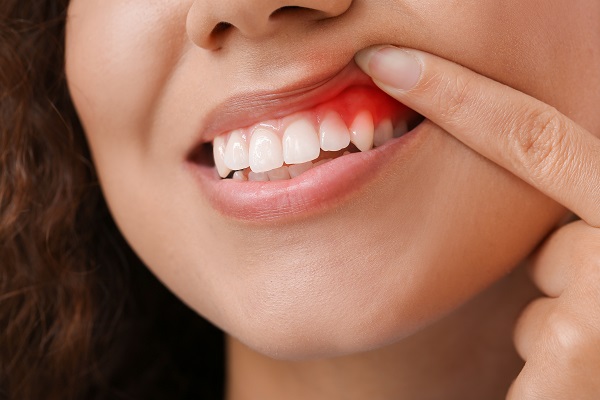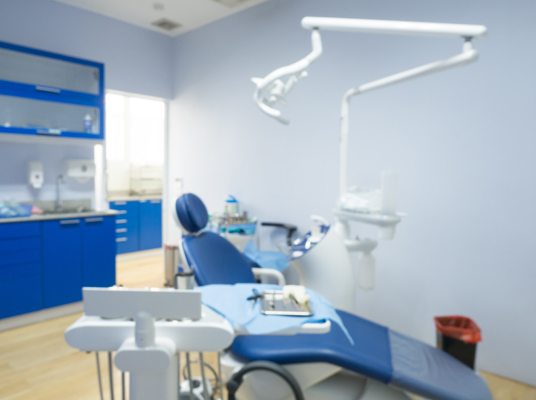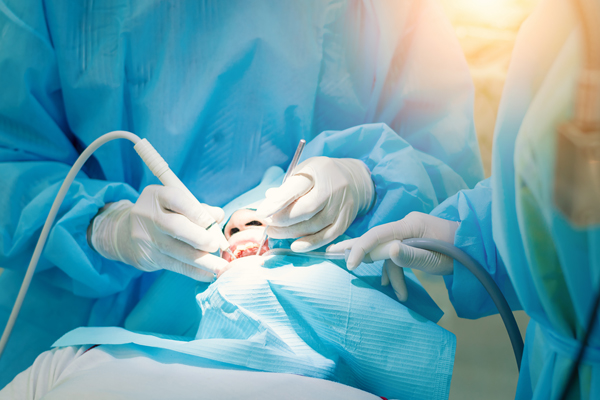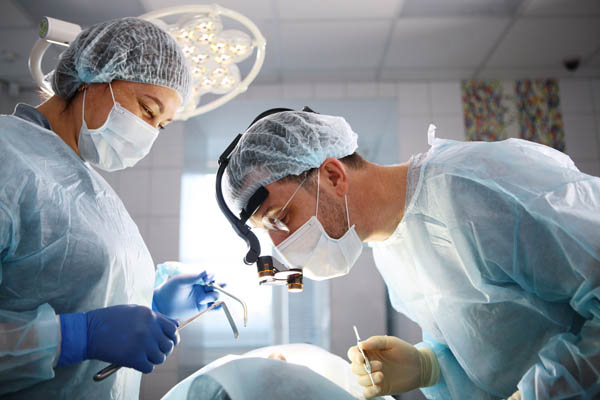Periodontics Ventura, CA
Periodontics refers to a dental field that focuses primarily on diseases and conditions affecting the gums and supporting tooth structures. Periodontists provide services in diagnosing, preventing, and treating patients with periodontal, gum, and other oral diseases. Periodontal treatment can greatly improve symptoms, reduce pain, and prevent further dental complications from arising.
Periodontal treatment is available at Brighton Specialty Dental Group in Ventura and the surrounding area. We can help curb symptoms and keep oral diseases under control. Call us today at (805) 644-5284 to schedule an appointment or learn more about our services.
Signs Indicating Need for Periodontal Treatment
The most common cause of periodontal and gum disease is plaque buildup, often the result of poor oral hygiene habits such as inadequate brushing, flossing, and rinsing. Plaque eventually leads to tartar, a substance that eats away enamel and causes inflammation and infection. Tartar can also reach below the gum line, making the teeth harder to clean and maintain.
Other common risk factors include diabetes, hormonal changes in girls and women, medications that decrease saliva flow, certain illnesses, and genetics. According to the CDC, signs or symptoms related to periodontal disease include:
- Bad breath or bad taste that will not go away
- Red or swollen gums
- Tender or bleeding gums
- Painful chewing
- Loose teeth
- Sensitive teeth
- Gums that have pulled away from your teeth
- Any change in the way your teeth fit together when you bite
- Any change in the fit of partial dentures
“The most common cause of periodontal and gum disease is plaque buildup, often the result of poor oral hygiene habits such as inadequate brushing, flossing, and rinsing.”
Hard Tissue/Osseous Procedures
An osseous procedure is a periodontal treatment that reduces or completely eliminates bacteria living in pockets underneath the gums. explains that during the procedure , a surgeon cuts back the patient’s gums, removes the bacteria, and repairs damaged bone. Hard tissue procedures primarily curb the progression of gum disease but can also involve treating the enamel, dentin, and cementum.
In both hard tissue and osseous procedures, the primary goal is to remove bacteria from the pockets to prevent the spread of infection and disease. With advancements in modern dental technology, these procedures can be done using a laser that burns bacteria without coming close to the nerves, roots, or bone. Once the gums are reattached and sewn, they naturally heal and cling onto the tooth, slightly tighter than they were before.
“In both hard tissue and osseous procedures, the primary goal is to remove bacteria from the pockets to prevent the spread of infection and disease.”
Detecting Periodontal Disease
Typically, patients are screened for gum and periodontal disease during their routine check-ups. Dentists can identify and diagnose periodontal disease by checking for gum bleeding, swelling, firmness, and pocket depth (space between teeth and gum line). They also assess teeth movement, sensitivity, and proper alignment. If there are concerning symptoms, they may also examine the patient’s jawbone to detect any broken bones surrounding the teeth.
Stages of Periodontal Disease
The three stages of periodontal disease are gingivitis, periodontitis, and advanced periodontitis. Gingivitis is the beginning stage and refers to inflammation of the gums. Treatments for gingivitis include a professional cleaning and special mouthwash that eliminates bacteria from the gums. Periodontitis, the second stage, occurs when bacteria or infection has spread beneath the gum line. This stage is also reversible and can be treated by professionally cleaning the pockets using a special tool. Advanced periodontitis, the final stage, refers to when the infection damages the underlying bone and surrounding tissues, causing tooth loss or severe shifting.
“Dentists can identify and diagnose periodontal disease by checking for gum bleeding, swelling, firmness, and pocket depth.”
Check out what others are saying about our dental services on Yelp: Periodontics in Ventura, CA
Preventing Periodontal Disease
There are a variety of ways patients can prevent the development and progression of periodontal disease. First and foremost, practicing adequate oral hygiene habits is essential for proper oral care and function. The American Academy of Periodontology suggests doing the following to prevent periodontal disease:
- Brush your teeth: Brushing after meals can help remove food debris and plaque trapped between the teeth and gums; especially if one thoroughly brushes the tongue.
- Floss: Flossing at least once a day can help remove food particles and plaque between teeth and along the gum line that your toothbrush cannot quite reach.
- Swish with mouthwash: Using a mouthwash helps reduce plaque and can remove remaining food particles that brushing and flossing missed.
- Know your risk: Age, smoking, diet, and genetics can all increase the risk for periodontal disease. If at increased risk, be sure to talk with the dental professional.
- See a periodontist: Get an annual comprehensive periodontal evaluation (CPE) from a dental professional. A CPE looks at the teeth, plaque level, gums, bite, bone structure, and other risk factors for periodontal disease. Identifying symptoms of gum disease early is key to protecting the teeth and gums.
“First and foremost, practicing adequate oral hygiene habits is essential for proper oral care and function.”
Periodontal Surgery
In severe cases and advanced stages, some patients may require periodontal surgery to effectively remove an infection. Periodontal surgery consists of a variety of treatments that target different regions of the mouth. Surgical procedures include flap surgery, bone grafting, guided tissue regeneration, or soft tissue grafts.
During periodontal surgery, a small cut or cuts are made in the gums, lifting back a section of tissue. This allows the periodontist to remove tartar, bacteria, and infection from the gum sockets and the teeth. The gums are then reattached to fit more securely on the teeth. The entire process takes about two hours and the recovery period can take up to two weeks.
“Surgical procedures include flap surgery, bone grafting, guided tissue regeneration, or soft tissue grafts.”
Questions Answered on This Page
Q. What are some signs that indicate a person may have periodontal disease?
Q. What are hard tissue and osseous procedures?
Q. How do dentists detect periodontal disease?
Q. What happens during periodontal surgery?
People Also Ask
Frequently Asked Questions About Periodontics
Q. What are the most common symptoms of periodontic diseases?
A. In the beginning stages, patients commonly experience swollen, bleeding gums, bad breath, and increased tooth sensitivity. In later stages, they may begin to notice loose or shifting teeth, and eventually, bone and tooth loss. It is important to seek a periodontist when first noticing early symptoms.
Q. What genetic factors or conditions influence gum and periodontal disease?
A. Although gum and periodontal disease are often the result of inadequate brushing and flossing, many genetic and environmental factors can also cause disease. Periodontitis and periodontal disease have been linked to systemic illnesses, including stroke, heart disease, diabetes, and certain types of cancer. A periodontist can help you understand your risk factors.
Q. How is periodontal disease treated?
A. Periodontal disease can be treated in a variety of ways depending on the patient’s case of level of severity. Non-surgical methods, such as scaling and planing or antibiotic therapy, can be done if the infection is caught in its early stages. In gum disease and periodontitis, periodontal surgery is often required to effectively remove the infection.
Q. What other treatments can a periodontist perform?
A. Periodontists work primarily with the hard tissues of the mouth. They are also specially trained in oral surgical procedures, meaning they can perform tooth extractions, bone grafting, dental implant placement, and various cosmetic procedures.
Q. What can I expect during my periodontal consultation?
A. During the consultation appointment, periodontists often review the patient’s health history and referral form to better understand their case. They will conduct their own examination and assessment which involves looking for indications of jaw dysfunction, gum recession, loss of bone, and/or periodontal disease. Using a periodontal probe, they will measure the pocket depths between the gums and teeth to determine whether a patient has the disease and what stage they are currently in.
Quality Dental Services Can Transform Your Smile
By visiting us as soon as possible, our team can help get you the professional treatment you need. Instead of waiting around and allowing the symptoms to get worse, we can provide you with treatment options.
Periodontic Terminology
Call Us Today
Periodontal treatments can help prevent, curb, or treat periodontal disease and help you maintain a healthy oral cavity. Call us today at 805-644-5284 to schedule an appointment or learn more about our services.
Helpful Related Links
- American Dental Association (ADA). Glossary of Dental Clinical Terms. 2021
- American Academy of Cosmetic Dentistry® (AACD). Home Page. 2021
- WebMD. WebMD’s Oral Care Guide. 2021
About our business, license, and website security
- Brighton Specialty Dental Group was established in 1993.
- Better Business Bureau View BBB Business Review
- We accept the following payment methods: American Express, Cash, Check, Discover, MasterCard, and Visa
- We serve patients from the following counties: Ventura County, Santa Barbara County and Los Angeles County
- We serve patients from the following cities: Ventura, Port Hueneme, Oxnard, El Rio, Camarillo, Thousand Oaks, Ojai, Santa Paula, Carpinteria and Santa Barbara
- CA (License #35503). View License Information and Specifics
- National Provider Identifier Database (1699830729). View NPI Registry Information
- Healthgrades. View Background Information and Reviews
- Norton Safe Web. View Details
- Trend Micro Site Safety Center. View Details
Back to top of Periodontics








